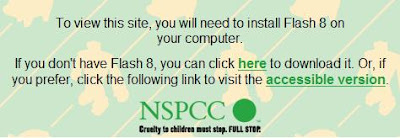My local radio featured an ad for the city of Newcastle - specifically, Christmas shopping. The ad ended with reference to a web site. Nothing wrong so far. The domain name they gave out was [I thought] "any one for newcastle dot co dot uk".
So I typed in 'www.anyonefornewcastle.co.uk' - which delivered a re-directed site on the domain 'ne1fornewcastle.co.uk' - which as it is the used URL seems to be the tag line for the promotion. For those who don't know [and I assume there will be many], NE1 is the post code for Newcastle city centre.
But here's the thing, I can think of two scenarios for this
1 'any one for newcastle' makes sense as a tag line - so why complicate the issue with this NE1 business? If that is the case, put this one down as 'ooow, double meaning, what clever marketers we are'. Sorry, but too much of an 'in-joke' to work.
2 They developed the NE1 campaign without realising that when spoken it sounds like 'any one' - but surely not? On the plus side, at least they had registered the relevant domain names if this is the case.
Either way, it all seems a bit complex to me.
So I typed in 'www.anyonefornewcastle.co.uk' - which delivered a re-directed site on the domain 'ne1fornewcastle.co.uk' - which as it is the used URL seems to be the tag line for the promotion. For those who don't know [and I assume there will be many], NE1 is the post code for Newcastle city centre.
But here's the thing, I can think of two scenarios for this
1 'any one for newcastle' makes sense as a tag line - so why complicate the issue with this NE1 business? If that is the case, put this one down as 'ooow, double meaning, what clever marketers we are'. Sorry, but too much of an 'in-joke' to work.
2 They developed the NE1 campaign without realising that when spoken it sounds like 'any one' - but surely not? On the plus side, at least they had registered the relevant domain names if this is the case.
Either way, it all seems a bit complex to me.













































 the Indesit Moon - so I put the name into Google. The return is shown below.
the Indesit Moon - so I put the name into Google. The return is shown below.




